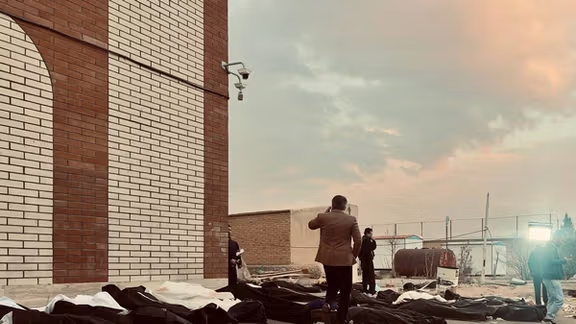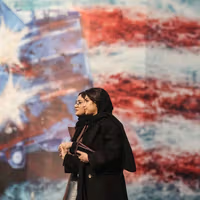The video leaked on X on October 17 shows Shamkhani, a member of Iran's Expediency Council, escorting his daughter, Fatemeh, into a grand wedding hall.
The footage, reminiscent of Western-style weddings where the father walks the bride down the aisle, drew immediate attention for the bride’s revealing gown and her mother’s low neckline — both unusual in a country where mandatory hijab and modesty laws have been enforced for decades.
The event, reportedly held in April 2024 at Tehran’s luxury Espinas Palace Hotel, had already drawn scrutiny at the time when Iranian media estimated its cost at around 14 billion rials (over $21,000). The family has never publicly commented on those reports.
Such gatherings are typically held in secrecy. “Without hypocrisy, why would there be such secrecy?" a user named Esmail Esbati wrote on X.
A pattern of elite excess
Some social media users have downplayed the wedding video, describing it as comparable to countless other ceremonies in Iran in terms of scale and expense.
However, for many Iranians, the Shamkhani wedding fits a familiar pattern — senior officials publicly preaching austerity and revolutionary simplicity while privately enjoying privilege.
In 2022, Parliament Speaker Mohammad Bagher Ghalibaf faced a similar scandal dubbed “Layette-Gate”, where his wife, daughter, and son-in-law were spotted returning from Turkey with luxury baby items. The episode, seen as a symbol of elite hypocrisy, resurfaced during his 2024 presidential bid.
Iran’s long economic crisis has magnified public resentment. After years of sanctions, mismanagement, and inflation exceeding 40 percent, the middle class has largely collapsed.
Hundreds of thousands suffer from malnutrition, and many young Iranians postpone or abandon marriage altogether as costs soar.
From wedding in mosques to wedding in luxury hotels
Social media reaction was swift and cutting. Users accused Iran’s ruling elite of flaunting their privilege while ordinary Iranians struggle with soaring costs of living and widespread poverty.
Posting on X, one user criticized leaders of the Islamic Republic for preaching modest living and anti-capitalism slogans, calling them “lies and deceptions.”
“When millions of Iranian youths cannot even afford the cost of holding a simple wedding, and wedding halls are going bankrupt due to the economic situation that these very gentlemen have created for the people, holding any kind of ceremony by the regime's officials is unlawful and haram,” the user added.
Another user mocked the ruling class’s rhetoric: “Hold the most luxurious parties you want for your children— we’re not jealous. But don’t say sanctions are a blessing or that people have chosen to live like this. When the majority of citizens live in poverty, marry your child in a mosque [not in Espinas Palace].”
The scandal’s timing has amplified its impact. In recent weeks, Iran’s morality police have returned to the streets after months of relative absence. Reports of plans to renew hijab enforcement have emerged recently.
Against this backdrop, images of unveiled women and opulent décor at the Shamkhani wedding have sparked outrage.
One user, posting under the handle “Son of Nietzsche,” wrote: “This video is the Islamic Republic in miniature. Rulers forcing hijab on the people while keeping them poor, and throwing hijab-free luxury weddings for their own children.”
Hardliners join the backlash
The scandal also drew reactions from within Iran’s conservative ranks. Ultra-hardline politician Ali Akbar Raefipour posted on X: “Can we ask how we can tell people to be patient with economic sanctions when the former Secretary of the Supreme National Security Council holds his daughter's wedding in one of the country’s most luxurious hotels?”
Raefipour also asked mockingly if hijab enforcement vans would be parked outside such venues.
Referring to Shamkhani’s upscale apartment, damaged in an Israeli strike earlier this year, and to alleged corruption cases involving his sons, ultra-conservative user Seyed Ali Mousavi wrote:
“From the mansion revealed in the Israeli attack to his children’s oil ventures and now this costly wedding, Mr. Shamkhani’s lifestyle shows a deep divide with the people in dire economic circumstances. Such extravagance and the claims that he makes destroy public trust.”
Ezzatollah Zarghami, the former head of Iran’s state broadcaster, on Sunday defended Shamkhani amid the controversy, saying the bride’s father kept his head down as he walked his daughter toward the groom during the “female-only” ceremony.
“Some women were veiled, and the rest were mahram (close relatives),” he added.
He also accused Israel of leaking the video, saying “hacking into people’s privacy is Israel’s new method of assassination.”














